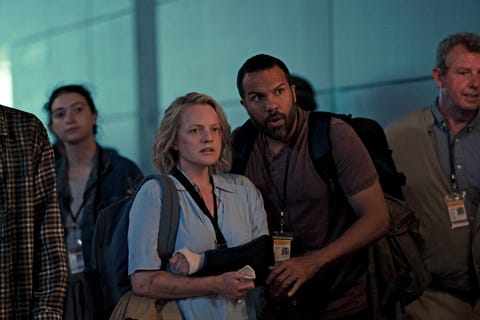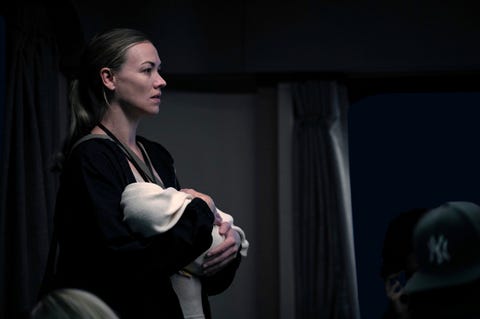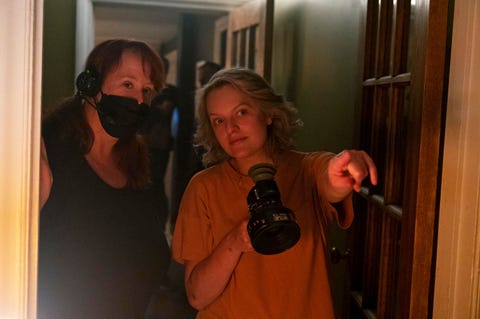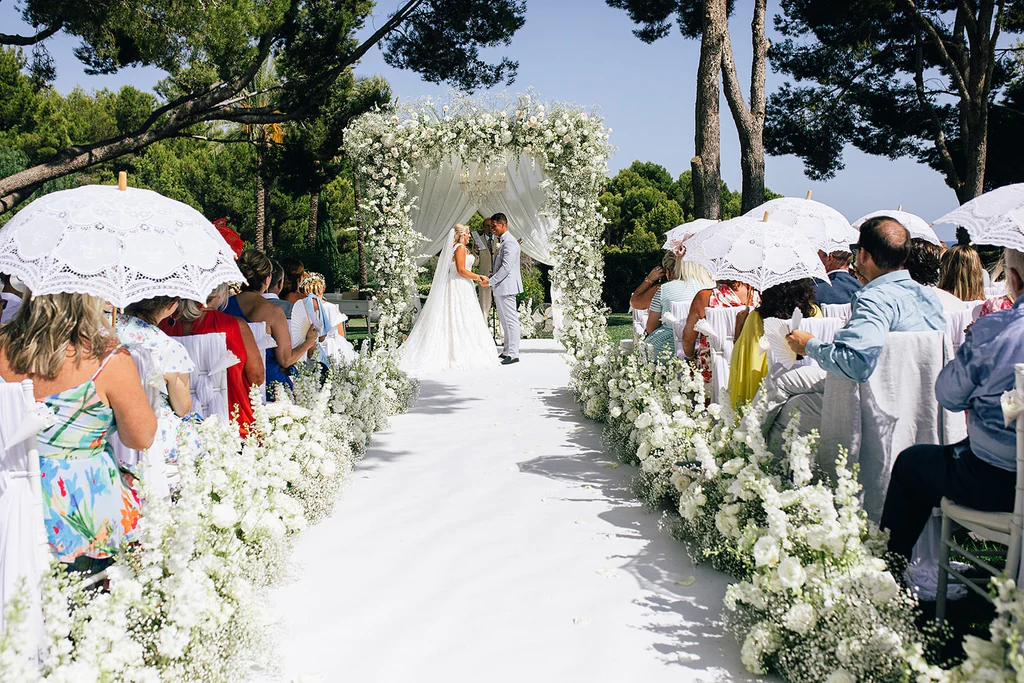Spoilers below.
June Osborne is finally headed to safety…or is she? At the end of The Handmaid’s Tale’s season 5 finale, she and her daughter Nichole have boarded a train of refugees escaping from Canada, only to find Serena Waterford and her child aboard too. And if that isn’t enough to worry about, June’s husband Luke has stayed behind, arrested and charged with murder, and their 12-year-old daughter Hannah is still stuck in Gilead. June may be free from violent anti-refugee protesters—like the one that ran her over with his truck—and she’s heading farther away from Gilead than ever before, but if the rest of her family is still in danger, then she might be too.
In the episode’s closing moments, both June (Elisabeth Moss) and Serena (Yvonne Strahovski) stand face to face holding their young children in their arms. Motherhood binds them together in multiple ways: not only because June was a handmaid for Serena and her husband (and endured abuse from the couple for years), but also because she helped Serena deliver a baby of her own this season. But, as June has previously made clear, that does not make them friends. Season 5 began in the aftermath of June killing Serena’s husband Fred, and ends with both women seeking asylum together. How will their dynamic continue to evolve by the end of this train ride, and as the events of season 6 unfold?
More From ELLE

Moss spoke with ELLE.com last week to discuss season 5 of The Handmaid’s Tale, which she says took nine months to shoot, and its emotional finale. Below, she breaks down Serena and June’s dynamic, how The Handmaid’s Tale reflects the current state of the world, and what’s in store for the sixth and final season.
First, I want to talk about Luke and June’s attempted escape in the train station. They’re about to board a train to get out of Canada with Nichole, but he stays behind because the police are looking for him. Could you talk about the emotions running through that scene?
I think that the whole episode is about the concept of how all of these characters think that they’re safe. They think they’ve got it figured out. They think they understand who their friends are and who their enemies are and what their next move is. And then, one by one in the episode, each character has that [thought] turned on its head. The episode is called “Safe,” and that’s what I took from it when I first got it and was trying to break it down to figure out what it was about.
For Luke and June, at the beginning of the episode, they think that they’re safe at home, that they’ve got their daughter. There’s a feeling of almost tranquility and peace when they’re drinking coffee in the kitchen, and they’re feeling like they have a plan and all of that. And then, of course, it all falls apart very, very quickly, with June getting hit by the truck and Luke finding out he’s going to be arrested for murder, and then they have to go.
So I think the feelings that are going through them are just feelings of fear and panic about how this life that they set up is falling apart. And they want to get their daughter to safety, and they want to get themselves to safety. And there’s that immediate danger of people who are looking for Luke. If he gets arrested, he’s going to be let out on bail, or whatever it is. And he’s going to be in serious danger from the people who have this growing anti-refugee sentiment in Toronto. So they’re in an extremely dangerous situation.
I thought that scene where Luke says goodbye was really interesting, because it was over the phone, and you and O-T Fagbenle played it so well. What was it like for you and O-T to convey that emotional conversation where you’re not face to face, at least on camera? And then what was it like for you filming it as the director?
Well, it’s one and the same, since I’m doing both [acting and directing] at the same time. We shot his side first. That whole train sequence took four nights to do, and was at three different locations. So when we were on the platform, that’s when we shot the phone call. And we shot his side on the first night because we knew that he was going to be driving the scene so much. And the way O-T works is very fluid. He likes to improv, he likes to try things, he likes to, in the middle of the take, go back to the beginning. And obviously, after five years of working with him, I know him really well, and I know how he likes to work. So I just thought that would be conducive to figuring out what the scene was going to be, to have him do it first.
Most of the time when he was doing his side of the phone call, I was watching on the monitor and talking to him on the phone. So I was half-playing June and saying my lines and half-directing him over the phone. Like, “Okay, go back and do that again,” or, “Say that again,” or reminding him about something that he wanted to try.
And then when we did my side the next day, he was in my eyesight. So I was able to have him at least there, even if I couldn’t see him. Our eyelines are so tight on the show…I probably have played 75 percent of this show to the camera, so sometimes I couldn’t see him. But when we did my side, it was great because we knew what the scene was. We knew what we wanted it to be.
I’d say that we co-directed that scene. That’s what I tell him. I think we co-directed it because he was really helpful when I was doing my side, just so I was able to do my performance. He was helpful in making sure we didn’t forget anything that we wanted to try, and making sure we said lines that we wanted to try. And responses to things that he had said, we wanted to make sure that we got on my side. We also cleared out most of the background, so it was actually quite intimate and quiet, which is what we wanted. We didn’t want to feel like everybody was staring at us. It was important to create the intimacy of the phone call even though they’re on the phone.
Role reversal seemed to be a theme this season, with Luke getting left behind from an escape in the same way that June has in the past, and Serena essentially being demoted to a handmaid. Was that intentional?
I think so much of this season is about the characters being at these tipping points and really having to decide who their friends are and who their enemies are. And I think that there’s a feeling amongst a few of the characters, particularly among Serena and Nick and Aunt Lydia, obviously, of feeling like the people that they have thrown their lot in with may not have been the best people to do that [with]. And people are starting to change their mind. I think that’s something that will be really interesting to continue to explore in season six.
Speaking of Serena, at the very end of the episode, June runs into her and her baby on the train. What were your initial thoughts when you read that twist in the script? And what’s going through June’s head in that moment?
When I first read it, I had what will hopefully be the same reaction, which was, “Oh my God, holy shit! No way!” And just loved it as a fan.
I think what’s going through June’s head is actually something that I want to leave open-ended, because I think it’s very complicated. I don’t know that she’s feeling any one emotion. I think that there’s some relief of not being alone. There’s some relief at having a friend, even if it’s the complicated friend you’ve got. She’s not alone and there’s relief in that. But at the same time, Jesus Christ, does it have to be Serena?
Right. Of all people.
Of all the people she could’ve run into, all the gin joints in the world. So I think it’s really complicated, but I really wanted to make sure that we left it really open and that was this moment of suspension that we were not answering the audience’s question. There was a line that we ended up not using because it just felt in the moment like we were answering the question. And I didn’t want to answer it. I wanted to be something that you would come back for in season six.
How would you describe June and Serena’s relationship this season? It was super fascinating to see their dynamic develop: it’s revenge but not, forgiveness but not, friendship but not.
I won’t go on and on, but just to go over the arc of the season, I think [June] starts out feeling nervous about what Serena’s reaction is going to be to what she did to Fred. And she’s trying to figure out who the villain is now. And then at the end of episode two, she thinks she figures out, “Okay, Serena is the villain.” And then she spends the next few episodes with Serena as the villain.
And then I think after episode seven, when she’s put in this position where she’s holding that baby and she could do exactly what Serena did and exactly what so many men and women in Gilead have done and take her child, she realizes, “Oh my God, they’re trying to make me one of them. And I am not going to be one of you.”
It’s a real breakthrough moment for her as a person. And I think it’s that moment when she rises above it and is like, “I’m not going to be you. I’m going to turn the other cheek.” She lets go of the hate, and she lets go of a lot of her anger towards Serena. Because the truth is, the problem is so much bigger than one person. It’s so much bigger than just Fred. It’s so much bigger than Serena. This is a whole country that she has to fight. Serena’s not the problem. And I think June realizes that.
Definitely. It’s fighting a whole system rather than just one other person.
Yeah. Exactly. The fight is much bigger than one individual.
The Handmaid’s Tale has always resonated with viewers, especially women in this time. There are obviously some ways that this season speaks to current events, like the extremism in Canada towards refugees, which, unfortunately I did see some parallels with headlines and sentiments in the U.S. right now. And also the show, which is about women’s bodily autonomy at its core, is coming at a time after Roe vs. Wade was overturned. What did it feel like filming the scenes with the refugees in Canada, and also filming the season knowing that this was going to come out in a post-Roe world?
Unfortunately, I used a lot of images and research from, at the time, what was happening in Ukraine, with people fleeing. And a lot of my research visuals were from, unfortunately, the week before, with these refugees fleeing on these trains and the crowds and children and people being separated and all of that. So that was something that was an unfortunate relevancy that I did tap into.
I think it’s a double-edged sword. Because on one hand, you are happy that you can shed some light on something or bring some awareness to something. On the other hand, of course, I wish that none of it was happening and it was just pure fantasy and just crazy things that we were showing in our crazy TV show. So the relevancy is a real double-edged sword for us, personally, as humans.
But our show, from the original book and all five seasons, is basically about the fight for human rights. It’s basically about freedom. It’s about human rights for everybody, and bodily autonomy falls into that. And the basic premise of our show is one where those rights have been taken away.
And so, unfortunately, we live in a society where our human rights are being threatened every day, and in a lot of countries, in America as well, are gone completely. And so the relevancy of it is…a double-edged sword. I’m happy as an artist to be able to do something that hopefully brings some awareness to a situation. At the same time, it would be fun if it was just fantasy.
Were you on set or when the Roe news came out at the end of June?
In my capacity on the show, I work on the show all year, so it’s difficult to say when it starts or when it ends. We’re starting to very, very, very preliminary soft-prep season six. Our official prep [for season 5] started in November of last year. We started shooting, I think, in February. Is that right? January? I don’t even know. So yeah, I was shooting the finale when that happened.
What was the energy on set like at the time, if you can remember?
Honestly, there’s a difference between the job we have to do and how we feel as humans and how we feel as women. So we have all kinds of personal conversations about how we feel as people and as American citizens. And obviously, we all believe in a women’s right to choose and in anybody’s right to choose, the trans right to choose. We believe in something that isn’t very present in our show. And at the same time, there’s a job to do, and you do your job.
What can we expect from season six? Are there any hopes that you have for the next and last season?
I think that it’s going to be a season where June is going to figure out who she is and who she’s going to be for the rest of her life.
Like we were talking about, the fight is not just about one individual; it’s much larger than that. And I think she is, in season five, getting to that place where she’s realizing that. And then season six is going to be very much about that, and then about all the characters figuring out whose side they’re on and what their next move is.
I think the one thing that we always say is that we do shoot the show through the specific lenses of these characters. I don’t think we feel an obligation to tie up the entire story of Gilead, especially not because we’ve got the sequel coming up in The Testaments. So we do have the opportunity to continue the story. But as far as June, I think she’s on her way to becoming the heroine that she will be.
We’re very excited to see that. I can’t believe it’s almost over.
I know, and it feels like it’s going to be so long until you guys get to see anything else. And I apologize personally for that, but every season we do gets bigger, and it takes longer to make every time. And because it’s the final season, we really want to make sure that it’s exactly what we want to do.
This interview has been edited and condensed for clarity.
Erica Gonzales is the Senior Culture Editor at ELLE.com, where she oversees coverage on TV, movies, music, books, and more. She was previously an editor at HarpersBAZAAR.com. There is a 75 percent chance she’s listening to Lorde right now.







More Stories
How to Hire and Train Seasonal Staff for the Holidays
Ugly Lemon launches 100% frozen lemon juice cubes
Affordable Friday – Holiday Party Style!